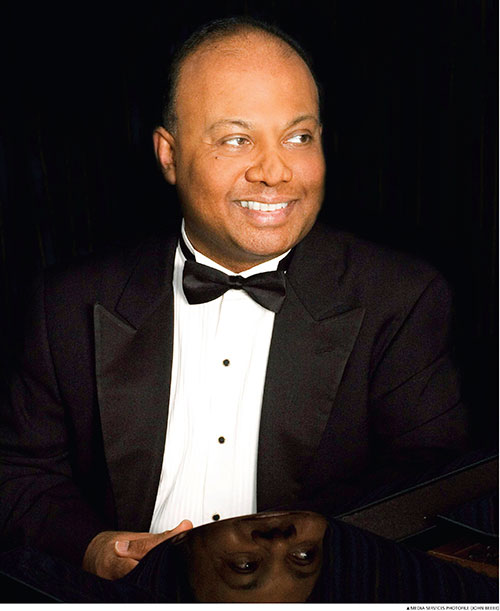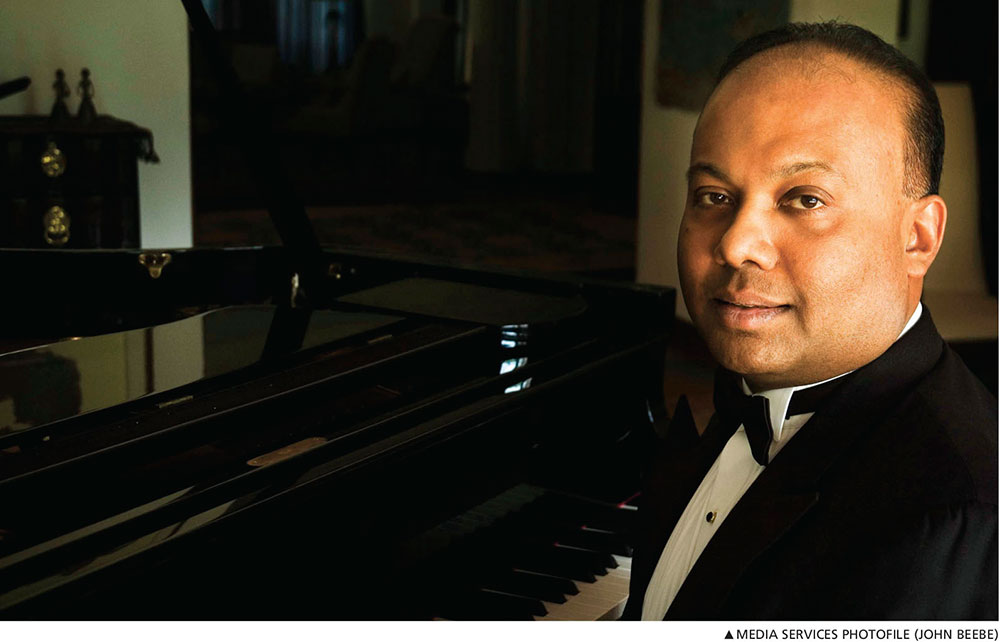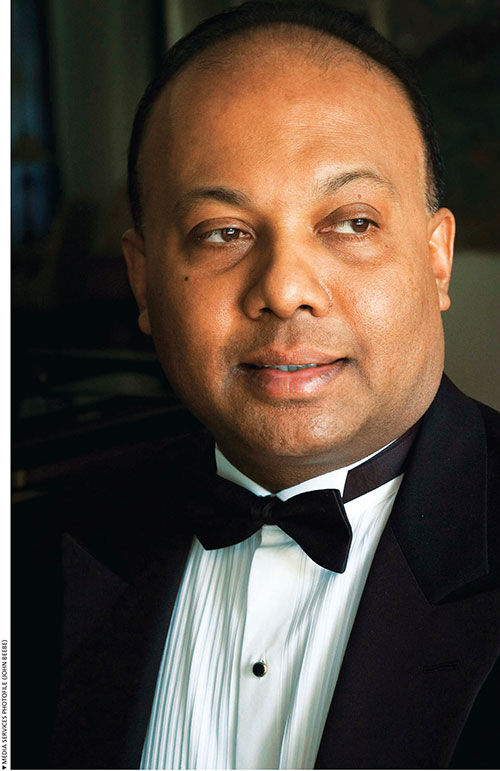Rohan De Silva
Collaborative piano maestro

Q: How did your journey as a pianist begin – and what inspired you to pursue collaborative piano as a specialty?
A: I began playing the piano at age of three, encouraged by my mother Primrose De Silva, an accomplished pianist and educator in Colombo. My mother noticed that I could play nursery rhymes by ear so she decided I needed formal training. At five, I also started learning violin with Mary Billimoria, a renowned teacher in Colombo.
When I was 14, my mother passed away; but I continued my studies with ‘Auntie Mary’ and completed my exams with the Royal Schools of Music and Trinity College. By 13, I had earned my Licentiate of the Royal Schools of Music, a qualification typically achieved in one’s 20s, which led to a scholarship at the Royal Academy of Music in London.
At 16, I moved to London to continue my piano studies and immerse myself in collaborative music. I played in trios, quartets and orchestras, and also studied cello for nine years. After London, I auditioned for The Juilliard School in New York.
In 1981, I was awarded a scholarship in the arts from the President’s Fund of Sri Lanka by then president J. R. Jayewardene, covering my Juilliard tuition. I became the first Sri Lankan student at the school.
Q: Having performed with some of the greatest violinists in the world including Itzhak Perlman, what makes these partnerships special – and how do you approach building musical chemistry with your collaborators?
A: Itzhak Perlman is certainly one of the greatest violinists and I’ve had the privilege of working with him since 1991.
Initially, I stepped in as his pianist while his regular collaborator – the late Samuel Sanders – recovered from a heart transplant. When Sam passed away in 1999, I officially became Perlman’s duo recital partner, a role I’ve had for 25 years.
What makes our partnership special is mutual respect and understanding. Over the years, we’ve developed an unspoken connection where we don’t always need to discuss the music – it’s a shared musical instinct. This deep bond allows us to communicate effortlessly during performances.
While we’ve toured the world together, we mostly perform in the US and Canada today, given Perlman’s age. The journey has been truly remarkable.
In addition to working with Perlman, I collaborate with many young talented musicians. These experiences are just as enriching because I learn from them as much as they learn from me.
Even during the pandemic, when concerts stopped, I stayed engaged with livestreamed performances with a group of young artistes.

Q: Could you share a memorable performance experience that deeply impacted you artistically?
A: Every performance with Perlman is special. The energy we share on stage is always electrifying. Even after all these years, performing with him is still thrilling.
I call him the ‘violin god’ – his artistry is unmatched. What makes our performances unforgettable is the deep musical chemistry between us. It’s a true partnership where we respond to each other instinctively, creating something unique each time.
One particularly memorable experience was in 2017, when I had the honour of performing with not just Perlman but also Pinchas Zukerman – two of the greatest violinists in the world.
We toured major US and Canadian cities including New York City, Boston and Chicago. It was the second time we performed together – the first being in 2007 – and reuniting 10 years later for another tour was unforgettable.

Q: How do you embrace your Sri Lankan heritage in your identity and musical journey?
A: I’m very much Sri Lankan; and I’m incredibly proud of it. Of course, I now have dual citizenship but no matter where I go, I always identify myself as a Sri Lankan-American.
If someone asks me where I’m from, my answer is always “I’m originally from Sri Lanka.” That’s a big part of who I am.
I carry my Sri Lankan heritage with immense pride. And I love Sri Lanka despite all its challenges – because let’s be honest, every country has issues. Sri Lanka is ‘home’ – and that will never change for me.
Q: What do you enjoy most about mentoring the next generation of musicians in your teaching and coaching journey?
A: I’ve been on the faculty at The Juilliard School since 1991 and teaching has been a fulfilling part of my journey. I typically teach chamber music once or twice a week, which allows me to balance my passion for performing and mentoring. I believe that teaching helps performers grow as artistes and keeps you engaged with your craft.
When mentoring young musicians, I stress the importance of true dedication and passion for their art. I only mentor a few but find it rewarding to help the next generation, especially as the music business becomes more challenging.
It’s tough to find opportunities but I encourage my students to consider all options including orchestras and teaching, which can provide stability. Teaching in particular sharpens your skills and offers valuable perspective. Ultimately, I want my students to thrive, even in such a competitive field.
Q: And what advice would you offer young Sri Lankan musicians aspiring to succeed on the global stage?
A: My main advice is to go to the West if you want to pursue music seriously. Talent alone isn’t enough; what matters is how you nurture and develop it.
In Sri Lanka, many aspiring musicians lack discipline in their practice and this is a key issue. They often focus on passing exams or making money rather than honing their craft. The industry has become more business oriented, and there’s a culture of jealousy and backbiting that hinders progress.
Musicians in countries like China, South Korea and Japan work hard from a young age with discipline, and Sri Lankan musicians need to match that level of commitment if they want to compete globally. It’s important to start young, as by the time you’re in your 20s, it may be too late to catch up.
The internet and social media also present a challenge – young people today often prioritise likes and followers over developing their skills. I make sure my students at Juilliard turn off their phones to avoid distractions.
To succeed in music, you need dedication, discipline and a commitment to excellence. Mediocre playing should never be accepted as being good enough.


